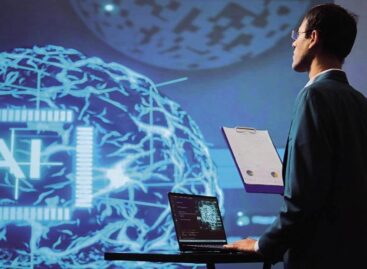Magazin: AI is the future
Fulbright research scholar Dr Katalin Fehér, an expert of artificial intelligence (AI) based society and culture was the guest of Chain Bridge Club.

Dr. habil
Katalin Fehér
Fulbright research scholar
BGE
Dr Katalin Fehér explained that machine learning is the best-known level of AI. AI is becoming increasingly complex with deep machine learning, and there are already algorithms which simulate the working of the human nervous system. Today algorithms can perform a certain task, e.g. a self-driving car can take a person from point A to point B. In the future these ‘small’ AI systems will be connected, forming a bigger system that is capable of a higher level of operation. Dr Fehér pointed it out: one of the main expectations about this technology is to be capable of prediction. She revealed that according to a survey, in the FMCG sector AI-related trends and innovations only have a 6-percent share, while sustainability is at 28 percent and consumer experience represents 22 percent.
Singularity vs. humanity
Dr Fehér underlined: one of the great questions about AI is where the ethical boundaries of information gathering and usage are. We are going towards narrow AI at the moment, which will be followed by general AI in 8-10 years’ time – in this stage a kind of clone is likely to be created for each individual – and the next phase will be invisible AI, which will be capable of influencing choices and decisions. In the clone stage we will already be living in a symbiosis with AI; in the long run we will reach super AI or singularity, which is going to be bigger than us.
According to an international Fortune 500 survey, the biggest AI-related expectations are present in the following six fields: healthcare, transportation and logistics, customer service, banking and finances, agriculture and trade.
Robots or humans?
The spreading of AI technology is also the source of many fears and types of frauds. In connection with the Cambridge Analytica scandal, discussion started about topics such as data misuse, the less visible activities of Facebook, the GDPR regulation of the European Union, etc. Dr Fehér explained that AI is now capable of influencing humans. A few years ago a research project in Berlin found that chatbots showing human emotions made humans treat them like they were humans (even though they knew they were robots), because they had an influence on people’s emotions.

Recent AI-systemt are developed for only one particular purpose, but these systems will become interconnected in the future and can work on a higher level
AI instead of HR?
Analysing the FMCG sector, Dr Katalin Fehér told that using AI technology results in 20-40 percent lower costs. Robotics can be utilised in agriculture very well, making the sector smart – and AI can optimise processes very well. AI and data analytics create excellent solutions for companies, for instance Unilever – they employ 170,000 people – is already recruiting workers with the help of AI. There is no need for a CV or motivation letter any more, a well-built LinkedIn profile is enough, which is analysed by AI and only the most suitable candidates are called in for an interview.
(A)Industry 4.0 and deep fake
Utilising AI technology in the industry raises many questions, such as taxing and insuring robots. Of course there is the eternal question as well: will robots take our jobs? AI is used more and more frequently in the fields of media and marketing, for instance Microsoft’s chatbot had to be discontinued, as users taught it to engage in hate speech on Twitter. Another bad direction is the deep fake technology, when AI uses our photos and videos to create a non-existing personality with our face and voice – this can be used for various kinds of frauds online. //
Related news
PwC Global CEO Survey: CEO confidence at a five-year low
🎧 Hallgasd a cikket: Lejátszás Szünet Folytatás Leállítás Nyelv: Auto…
Read more >Related news
Lidl guarantees fairer prices for cocoa farmers
🎧 Hallgasd a cikket: Lejátszás Szünet Folytatás Leállítás Nyelv: Auto…
Read more >40 secure jobs, sustainable solutions – new BURGER KING® in Csepel
🎧 Hallgasd a cikket: Lejátszás Szünet Folytatás Leállítás Nyelv: Auto…
Read more >








